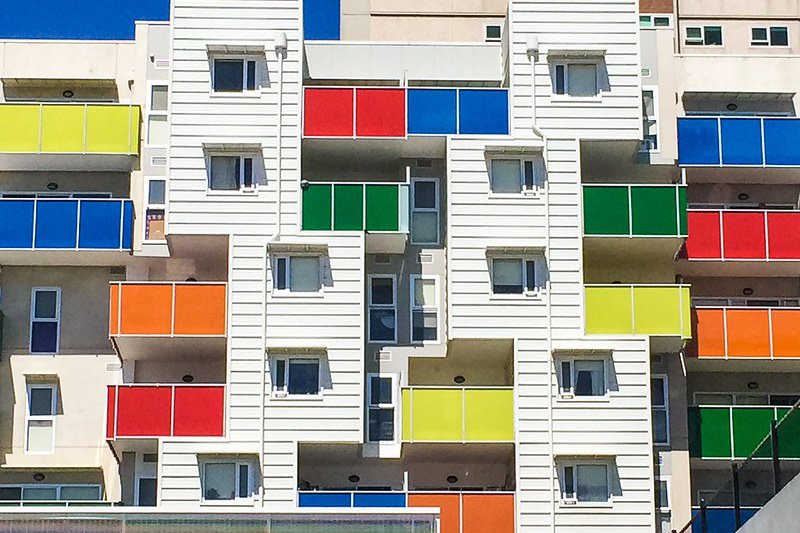Extract from Eureka Street
- Andrew Hamilton
- 25 February 2021
To a Martian observer, the public response to COVID-19 might resemble a ceremonial dance in which the participants go forward, then back, mingle, change partners, bow to one another, twirl, and finish as they began, but with a greater distance between them.

One example lies in housing. Before the pandemic struck, the price of houses was rising as were rents, the wealth of the few was increasing as was the debt of the struggling, at the same time as average income and job security were declining. The rising housing market was fuelled by debt, as was public anxiety. Since public housing was totally inadequate to meet needs, people who were homeless slept in the city streets. The worst affected were people with mental illness, addictions and unemployed.
After massive public spending and embracing of solidarity in response to COVID-19, we are seemingly returning to where we began. As Government support threatens to be withdrawn, the price of houses continues to rise, rent and evictions and homelessness are also likely to rise, those with money to invest will increase their wealth, and the anxiety of those in unprotected jobs, high debts or no income will also rise. The dancing is over.
Discussion of housing usually focuses exclusively on its relationship to the economy. Housing is seen as property, and the most important questions are seen as having to do with buying and selling. Many government initiatives in the area result in maintaining and increasing the price of houses with a consequent rise in inequality. This transactional aspect is important. It needs, however, to be seen in the light of the larger human good. From that perspective housing in all the various forms it takes in different cultures is not a possession but a human need.
The distinction between housing seen as property and as a human value is embodied in the discrimination we make between a house and a home. The concept of home suggests that the place where we live is more than bricks and mortar. It is the centre of a network of relationships that lie at the heart of human flourishing. In the first place these comprise our interpersonal relationships. As we emerge from the coronavirus crisis we are aware of the strain that the uncertainty, the restrictions on movement and the anxiety about our own health and that of people whom we love can put on our relationships. The increase in mental illness and domestic violence are only two indices of this. Lack of security in housing multiplies that strain.
The fear and reality of constantly having to seek and find accommodation also erodes the connection between stable personal relationships and place. It affects relationships to particular schools, to doctors, sporting teams and other social groups. All these relationships are related to place — the church, the parks, the shopping centre, the school, the cycling tracks and so on. Housing insecurity makes it more likely that children will learn to travel light emotionally, later having to reckon with all the difficulties this can pose to stable relationships.
Having no assured place of residence also affects our relationship to ourselves. It is the focus of our personal, family and local lives. Insecure housing affects our self-esteem, especially if we are sleeping rough, couch surfing, or living in our car. We turn from citizens, people of the city, to vagrants. This is accentuated if we cannot easily receive communications sent from government departments and businesses. With instability we also put at threat the central human capacity to dream and to shape our future. If we have no stable living place this becomes difficult. We live from day to day, not by choice, but by indigence. Fear and the reality of homelessness limits our horizon to daily survival.
'These practical remedies and their consequences are complex and open to debate. They should not however weaken the recognition that in a fair society all people must have access to assured and decent housing.'
The anxiety and isolating effects of insecure housing fall largely on those least capable of bearing them. People experiencing mental illness, prisoners released penniless from gaol, young people escaping from violent homes and people already isolated by addiction are among those most in need of stable housing and least able to cope with its lack and consequent isolation.
What can be done? Recognising the connection between the growing inequality and growing pressure on housing that have followed the pandemic and our response to it is the first step towards any answer. To remedy the threat and reality of homelessness we must address the gross disparity in wealth and opportunity between people who live securely and those living in insecurity. The current economic settings which see and protect houses as property assets contribute to marked inequality. They can be made just only by government action that looks to the good of all people, especially the most vulnerable. That must be based on seeing housing as more than property whose distribution can be left to the market but as a human good that must be available to all.
The most obvious way to do this is for governments, Federal and State, to invest heavily in social housing. Yielding to the siren call of small government in recent years they have neglected their responsibilities and left public housing on the rocks. Waiting lists far outweigh stock, with particularly dire consequences for the most needy.
To rebuild public housing in a way that enables the universal right to shelter to be met will be costly. The cost must be met from elsewhere. Given that the high price of property is due in large part to demand financed by debt, and is exacerbated by the various subsidies to house ownership, a starting point could be to remove these concessions and to tax property speculation. If done in a way that avoided unintended consequences, that might provide savings and revenue for funding social housing and perhaps lower the cost both of buying and renting houses.
These practical remedies and their consequences are complex and open to debate. They should not however weaken the recognition that in a fair society all people must have access to assured and decent housing. Property has a social license.
 Andrew Hamilton is consulting editor of Eureka Street, and writer at Jesuit Social Services.
Andrew Hamilton is consulting editor of Eureka Street, and writer at Jesuit Social Services.
No comments:
Post a Comment